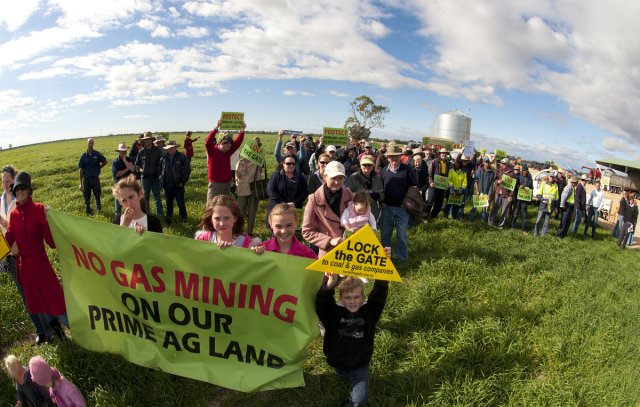
The onshore gas industry in south-east Australia is in trouble. Public opposition, low international oil prices and projected supply shortfalls have combined to cast doubt on the profitability of the industry.
The international finance company Credit Suisse has indicated that the LNG (liquefied natural gas) export facilities at Gladstone in Queensland may fall short of meeting their export contracts in coming years, by up to 30%.
In January, Credit Suisse found that at the current, unexpectedly low international oil prices — which influence the price for LNG exports — and unfavourable currency exchange rates, major industry players like Santos and Origin Energy could see their share value plummet.
All this suggests that the industry is in significant financial trouble.
The NSW parliamentary inquiry into “Supply and Cost of Gas and Liquid Fuels in New South Wales” released its report on February 25, recommending “an Australia-wide gas reservation policy, to assist in containing gas prices and to ensure security of supply.”
The inquiry recommended that coal seam gas (CSG) industry expansion “is not contemplated” until the NSW Chief Scientist's 2014 recommendations for vastly improved industry regulation are implemented.
Gas prices for Australian consumers are now rising rapidly. This has led to calls for a policy to reserve a percentage of gas production for the domestic market that have been broader than the NSW government inquiry.
“Every other gas-exporting nation on the planet has introduced some form of gas reservation legislation to protect its local users,” Australian Workers' Union national secretary Scott McDine said. Australia is the only one that has allowed a free-for-all — and this is the result.” The AWU covers employees in many industries that are major gas users.
With the NSW state election looming, the notion of a “gas crisis” has been cited to pressure the state to accept growth in the CSG industry. Federal industry minister Ian MacFarlane, for example, suggested late last year that NSW "will be very short of gas in three to four years," as he announced support for a new pipeline from the Northern Territory to NSW.
But other analysis does not support the idea that there is a shortage of gas. “NSW faces a gas price shock not a shortage,” The Australia Institute bluntly stated in a submission to the inquiry.
“Gas production in eastern Australia is undergoing an unprecedented expansion, and is expected to triple within the space off just a few years. At the same time gas consumption in NSW is falling,” the submission said.
Melbourne University researchers found that gas use in NSW could halve in 10 years. “With prices rising, consumers who reduce gas use and switch to alternatives might well weather the storm best, and that could mean a big drop in the demand for gas,” Professor Mike Sandiford and Tim Forcey of the Melbourne Energy Institute wrote.
The national Lock the Gate campaign responded to the inquiry positively. National coordinator Phil Laird said: “We are calling for [NSW Premier] Mike Baird to immediately announce a completely new approach, which puts CSG mining on hold in NSW ... The pain that is being experienced by landholders, manufacturers and gas consumers is being caused by the greed and secrecy of the gas giants, and the national interest is suffering."
The gas industry in NSW has seen a series of public losses of face in recent years. Protesters successfully forced gas company Metgasco to abandon plans to open gas fields in the Northern Rivers area, Santos has faced widespread condemnation over water contamination and spills in its Pilliga forest gas fields and, most recently, AGL suspended its unpopular Waukivory project near Gloucester in January after highly toxic BTEX chemicals were discovered in waste water onsite.
On March 6, three weeks before the NSW state election and with the government facing rising opposition to its CSG policies, Resources and Energy Minister Anthony Roberts announced the cancellation of petroleum exploration licence 463 formerly held by Dart Energy.
The permit covered the whole Sydney Basin, from Bundeena in the south to Gosford in the north and as far west as Rooty Hill.
On February 27, the Northern Territory government decided to allow continued “fracking” (hydraulic fracturing) to access their considerable shale gas resources. On the same day, Tasmania extended a one-year ban on fracking by five more years, citing community concern, public health, and the image and reputation of the state's food industry. Victoria's new Labor state government has said they will maintain an existing moratorium on fracking until at least the end of the year, pending further investigation.
ABC News reported that Santos spokesperson Matt Doman says the sooner fracking begins in the NT, the better. "This is too critical an industry, too critical an opportunity for the Territory for there to be protracted delays," he told ABC.
As the industry faces massive projected shortfalls in supply to meet their export contracts, and ongoing opposition to expansion in eastern Australia, the prospects of opening the NT's huge gas fields — and linking them with a pipeline to the eastern states' export facilities — may be a lifeline for those companies facing supply difficulties.
Or it could be the next big battlefront with environmentalists and landowners.
Like the article? Subscribe to Green Left now! You can also like us on Facebook and follow us on Twitter.